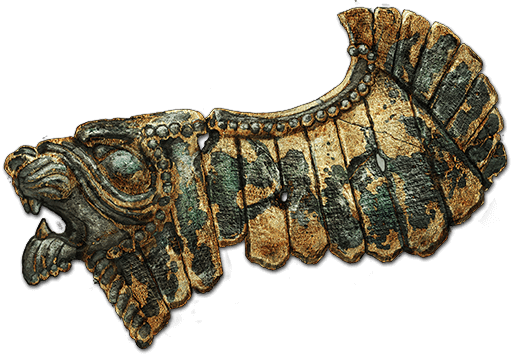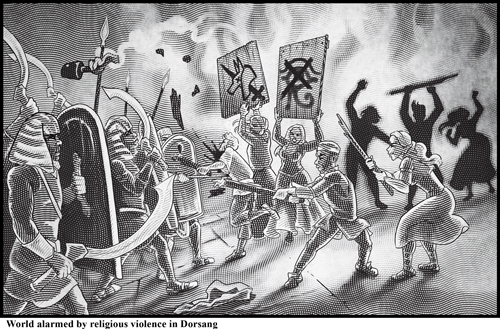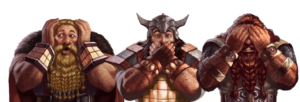
Edward Stuttgart, Augstat, Hesse
Religious tensions have escalated throughout Chaldea in the wake of Emperor Kordaava’s death. The Kordavan Informant has previously reported Governor Hellwig von Gustavus publicly blamed the emperor’s assassination on the Ma’at god Set. Though unable to provide adequate legal proof of this, Gustavus was still able to outline a credible list of circumstantial evidence to support his charge.
Governor Gustavus’ accusations were enough to inflame religious sentiments throughout the empire. When Kordaava ascended the throne forty years ago, he announced that worship of Set was the official religion of Chaldea, and within a few short years, religious devotion to all other gods was outlawed, with a few minor exceptions. Scholars argue that this salient issue added fuels to the fires of dissent, though most worlds in the Pearl Universe are populated primarily by monotheistic people or, in some cases, a pantheon of deities. Chaldea’s history is unique among these religious arrangements: During the Claw Hammer War, the elder dragons brought abundant life to Chaldea from all corners of the universe, and with those people came a colorful array of religions from a host of divergent worlds. Yet the emperor is often quoted as saying, “Most worlds follow one god. My god is Set. And therefore, my empire’s god is Set. You don’t have to worship my god, but you may not worship another.”
Kordaava’s uncompromising monotheism runs counter to Ma’at polytheistic culture that openly celebrates the worship of many gods. It also seems unintuitive to many scholars and researchers of religious structures. Asenath-Perenma’at, Professor of Religious Studies, Chaldean Studies, History, and Divinity at the University of Dorsang argues: “The rich and vast Pearl Universe with its million spheres is much too complex an organism to be controlled by a single entity.”
The worship of other gods did not disappear overnight at Kordaava’s rise to power. Those who lived through them still recall the great purges, the inquisitions, and the destruction of temples to other gods or, in many cases, the re-consecrations of those temples to Set. Eventually, the will of Kordaava prevailed, and the worship of Set became the standard. Yet the worship of other gods did not desist; instead, it went underground. Even today, some homes have hidden shrines, secret sects to nature goddesses dance naked in the Garnon, and itinerant priests avoid the authorities in the remote farmlands of Perrin. While the emperor lived, these technically illegal activities were generally ignored by the religious authorities, provided they weren’t flaunted publicly, but practitioners of these so-called “heretical” activities have been emboldened as news of Kordaava’s death spread across Chaldea.
Setite inquisitors have responded in kind. Raiding parties backed by the Church of Set have been reported to be rounding up apostates for torture and sacrifice in several kingdoms. In some cases, local authorities have sought to intervene, but Kordaava’s Imperial Code of Law gives the Church broad authority to punish crimes of heresy.
In the Free City of Esh—so called due to its status as the lone city in Chaldea where religious freedom is still tolerated—clashes broke out in the streets between warriors, priests, and parishioners of the Church of Set and the Church of Isis. These incidents resulted in an estimated 221 deaths, including 43 civilians not directly involved in the conflicts. In addition to loss of life, tremendous property damage caused by arson ravaged the once beautiful seaside port. Witnesses allege to have overheard a high-ranking priest of the local Church of Set order her troops to “Take this city,” fueling speculation that religious freedom may no longer be tolerated in Esh.
In Saratof, the Imperial capital of Kordaava’s vast empire, what began as a political demonstration outside the Hoot Weret of Set of self-described “Gustavans”—a slang term derived from Governor Gustavus’s call to arrest the Membit of Set, Hulsan—turned violent as protestors and temple guards clashed, killing an estimated 134 people, mostly civilians.
Origins of the Conflict
Set is a member of a pantheon of gods called the Pharaohs, a religion brought to Chaldea by the Ma’at people during the Claw Hammer War a millennia ago. The descendants of those original settlers eventually formed the kingdom of Ta Shemau, and the religion’s various deities flourished within their kingdom while establishing a foothold in other kingdoms as well. According to historians, for centuries, Set was worshipped as just one of over a hundred deities from the Pharaohs pantheon—an important deity of the pantheon but not the chief deity.
After Kordaava’s rise to power and his ascension by Set to divine stature, the priests of Set announced it had been revealed to them through prayer and holy communications that Set was the only legitimate deity of the pantheon, and the other deities were merely shemayu or demonic pretenders. A schism formed, leading to a host of religious controversies in Ta Shemau and the subsequent redirection of the highly religious population to the devotion to Set. This shift led to widespread civic upheaval and violent conflicts, resulting in many deaths.
Pharaoh Civil War Spills Over onto Chaldea
With the great emperor dead, Pharaoh scholars are now free to speak without fear of retribution, and they suggest a state of civil war exists within the Pharaoh pantheon and that this conflict has now spilled over onto Chaldea.
“Many gods stand allied against Set,” explained a Ma’at scholar who asked to remain nameless, despite their alleged freedom from retribution status. “The dark serpent god fights a multi-front war on dozens of worlds.”
When asked what sparked the conflict, he insisted, “Control. Absolute control, of course. The heart and soul of the pantheon is a stake.
“Proof? You need only look as far as Esh,” he replied, seemingly annoyed by the implication that his statements might be interpreted as conjecture.
Once the violence in Esh ebbed, Isis parishioners quickly reported engaging Set military assets, the kind and strength of which have never seen or felt on Chaldea previously.
“Creations of the serpent god Set darkened these streets,” stated a young acolyte of Isis, “sons and daughters of Set—bastard creations of poison.”
He held forth a serpent-engraved black khopesh as validation, one that was allegedly once wielded by a high-ranking Setite soldier whose visage reflected the god. “Obsidian, mined in Duat and forged in the underworlds desert heat. I took it from a Setite’s cold dead hands.”
“Yes, the Ma’at people are tainted by war and hatred,” wrote Djehuty-Ibis, a priest of Thoth, who agreed to be interviewed via Gekkon. “The violence between Set and Isis in Esh can leave no doubt, there is more to the conflict than merely the death of our emperor. I’m afraid this is just the beginning.”
Ta Shemau would appear to be on the brink of a full-blown religious civil war of its own due to the emperor’s death, though some question if the tension could be only a reflection of larger pantheon conflict. Across the country sects to these “old gods” are re-energized by what many see as an opportunity to set old injustices right.
Of particular note is the perception of the late emperor among these religious zealots. Setites insist on retaining prominence and the power bestowed upon their Church by an emperor whom their deity might have actually assassinated. Meanwhile, the churches opposed to Set once reviled the emperor and his purge of other religions, but his death has now created an opportunity for them to assert themselves. In doing so, they find themselves to be odd bedfellows with ardent Kordaava supporters who blame Set for Kordaava’s death. Some even speculate they might soon be calling themselves Gustavans.
As for the other pantheons, there’s little to be confirmed at this stage of monumental events. Anum, Avestan, Celtic, Norse, Olympians, Slavic, Ugaritic—all are some of the more prominent sanctuaries visible above the Esh skyline. With the emperor dead and the many Ma’at factions at each other’s throats, it remains to be seen how the other religions may angle a response. To most, it seems doubtful their religious observance will remain in the shadows for long. Without Emperor Kordaava and his Spear of Set, none can predict if the Church of Set on Chaldea is capable of fighting a war against a rising tide of every other religion.


Imperial Senate to Convene During Spring
Bogaslov Tihomir, the Imperial consul to the Senate, has called for an assembly of the entire Senate to take place during the week of Spring. Tihomir issued a Senatus Cogere, a summons to Senate, to over 500 Imperial senators from across the world of Chaldea, in which he writes, “Spring is the time for planting new crops, for launching new projects and campaigns. Let us come together and decide the fate of this great empire built by our beloved founder, Marcosta Kordaava.”
The members of Imperial senators include the rulers and most prominent nobility of all the kingdoms of Chaldea. The summons goes on to establish that the primary agenda topic will be the appointment of a new emperor and what powers this individual should possess.
Religious Executions Return to the Public Square
A Tavjan priestess was sentenced to death by beheading this week for openly praying and giving praise to the Norse god Odin.
The woman had erected a makeshift wēoh, a runestone shrine, outside the Nordisch Temple of the Fallen, a revered Hessen landmark that has been closed and boarded up since Emperor Kordaava outlawed worship of all gods except of the Pharaoh god Set.
“Worship of false gods is strictly forbidden,” proclaimed a Ma’at proctor on the steps of the Hoot Weret after priests of Set reviewed the unusual case. “For the act of capital sacrilege, the criminal is hereby sentenced to a week in the pillory and then prompt execution by beheading.”
A death sentence for a first-time offender is irregular and arouses suspicion among many, some of whom believe there is more to the story than illegal worship of an evil god. Allegedly, the woman in question had been freely healing the sick and wounded and anyone else who asked for assistance.
“Odin, bless you,” the priestess shouted as the axe fell.
“She cured my son of jail fever,” said one mother, eager to share her story with anyone who would listen, before Setite guards fell upon her and rushed her away.
“The Church of Set cannot have other religions seen performing acts of goodwill and kindness,” said a Heck knight standing guard over the execution stage at International Faire. “It undermines their divine authority.”
The Haus der Herren refused to intervene in or even consider the matter. It is Imperial business, said a letter released shortly before the execution.
Jarl Kulbrandr Pisses on Imperial Summons
One topic of rampant speculation these days is the question of whether Kordaava’s empire will stay united or whether various kingdoms will dare to claim independence. Emperor Kordaava was a powerful, formidable ruler, who built his empire through military conquest and his personal physical gravitas. Without him at the helm, the issue of who might fill his shoes and hold the fractured body of the current government together is one for fervent discussion and debate.
Jarl Kulbrandr of Tavja has apparently decided not to wait to find out. According to Hothseti, commander of the 5th Battalion Wing of Tavjan lion riders, when Jarl Kulbrandr received the Senatus Cogere to travel to Saratof for a convening of the Senate, he elected to urinate on the edict. Hellwig von Gustavus, whose governorship includes the kingdom of Tavja, has refused comment.
Gustavus Frees Pa-pa Sarva, Patesi Iltani Outraged Once Again
In a previous issue, The Kordavan Informant reported that Governor Hellwig Gustavus offered asylum to Pa-p Sarva, the would-be assassin of Patesi Iltani, the ruler of Akkadia. The Pa-pa fled to Hesse after the attempted coup and was arrested by the Hecks and would have been extradited to Akkadia had Gustavus not intervened. Since then, Sarva has been under house arrest. This week, the office of Governor Gustavus announced that Sarva has been released, citing lack of evidence of wrongdoing. Patesi Iltani responded with outrage, threatening, “Who will protect you from my wrath, Hellwig, now that your drasildar has left its post?”
University of Kordava Sponsors Archaeology Dig
The University of Kordava announced that it has approved funding for an archaeology dig to search for the lost city of Ur-Kish, a mythical human city of the ancient Kaldi that some historians believe existed in Chaldea before the dwarves. Dwarven scholars are outraged at the thought. Grand Master Kurig of the Stollhofen Clan and commander of the Hecks said, “Don’t you think if humans existed in Chaldea before dwarves, we would have found evidence of them thousands of years ago?”
Professor Ulbert, the archaeologist who will lead the expedition, said, “We have found ample evidence. It’s hard to ignore the Hoot Weret in International Faire that Emperor Kordaava dragged out of the Ardayan Desert. Maybe those dwarves of yesteryear found evidence of humans but failed to consider it noteworthy. The dwarven race seems to suffer from a ‘willfully blind contagion’ that affects reason as well as sight. The eyes are useless when the mind is blind.” Grand Master Kurig remained unmoved. “Humans are the only species in all of Chaldea who have to be first at everything, even if they have to dig for non-existent ruins to justify it. We dwarves can’t see what’s not there, but we can certainly recognize arrogance when we see it.”



Issue #110





